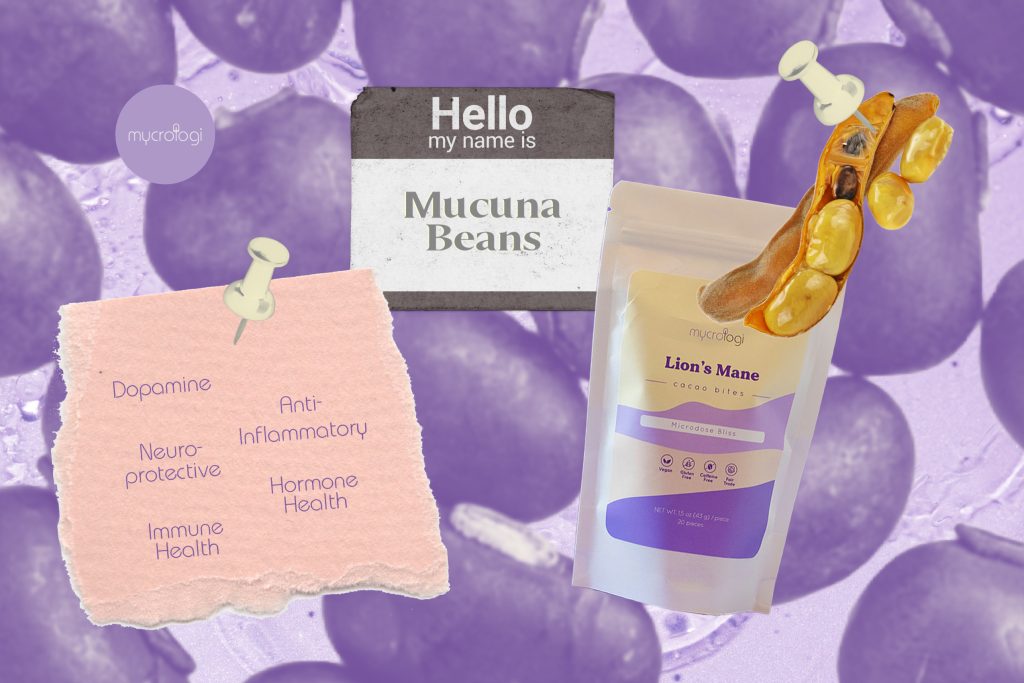Health
The Exciting Benefits of the Mucuna Bean
Hosting about as many names as it does health benefits, is the tropical legume most commonly known as the Mucuna bean. Sometimes known under other aliases such as velvet bean, cowage, or monkey tamarind, is a powerful health-boosting legume that has been used for centuries in Ayurvedic medicine as a way to treat various health conditions.
In more recent years, Mucuna beans have gained popularity in the wellness community as being an all-natural health supplement, fit for a variety of different health focuses.
- Dopamine
If Mucuna is most popular for any one reason, it’s probably the dopamine reason. This is because Mucuna beans offer a uniquely high source of L-dopa, which is a precursor to the feel-good dopamine hormone. Because Mucuna is said to have the highest plant-derived concentration of L-dopa on the planet, you’re not gonna find much better than this if an increase in the happy hormone is something you’re after.
L-dopa is a naturally occurring amino acid, which transforms into dopamine in the brain. Dopamine is responsible for the good feelings such as pleasure, satisfaction, motivation, mood, memory, and more. A deficiency in dopamine however, accounts for feelings of anger, irritability, low mood, anxiety, depression, and hopelessness. In all, low levels of dopamine have a significantly negative effect on general well being, which is why healthy dopamine levels are something to prioritize if you are prone to mental health issues and/or feel that the negative feelings tend to outweigh the good.
With Mucuna beans being such a rich source of dopamine, Mucuna have been known to be helpful in the treatment of mental illnesses such as anxiety and depression. The boost in dopamine can result in strong feelings of euphoria and bliss, boosted excitability, and general feelings of happiness, though it is still something to be careful with.
Because Mucuna beans have the ability to raise dopamine levels hard and fast, it is best to supplement in light to moderate doses, with frequent breaks in between to ensure there are no future malfunctions within the brain’s natural reward system.
- Hormone Health
Mucuna beans possess special compounds called phytoestrogens, which is essentially a form of plant-based compound that mimics estrogen in the body. The phytoestrogens help balance estrogen levels, making them highly beneficial for overall health.
Healthy intake of phytoestrogens are said to have benefits on not only the reproductive system, but the immune system and heart health as well.
Mucuna beans are also known for their unique aphrodisiac properties, and have been commonly used to treat male infertility.
- Immune Health
Mucuna beans are a rich source of antioxidants, which help to relieve the body of inflammation and oxidative stress. The beans also contain over 60 phytochemicals that help strengthen the immune system, including alkaloids, flavonoids, and terpenoids.
Studies show that Mucuna beans increase the production of white blood cells as a result of their high polysaccharide content, which plays a crucial role in fighting infections and diseases. The high protein element of Mucuna beans are also thought to improve immune function, as high protein levels are essential for the growth and repair of immune cells.
When we think about the immune system, we most often think of being sick and/or preventing illness—in reality, poor immune health can also account for low mood, feeling of depression, and lethargy. Seeing as negative emotions can actually suppress the immune system, a mental-health boosting plant like Mucuna beans seem to be effective in treating mental ailments while also strengthening a poor immune system. Double win!
- Inflammation
As stated prior, Mucuna beans have the ability to reduce inflammation in the body, therefore reducing the risk of chronic diseases including arthritis, heart disease, and diabetes.
Mucuna beans are rich in saponins, a naturally-occurring plant compound known to be very rich in anti-inflammatory properties. Alongside that, saponins have the ability to lower cholesterol in the bloodstream, by binding to cholesterol molecules in the intestine and slowing its absorption into the blood.
In a study that analyzed inflammation markers in patients with Parkinson’s disease, it was found that upon eight weeks of supplementing Mucuna beans, levels of C-reactive protein (inflammation marker) were greatly reduced.
The anti-inflammatory potential of Mucuna beans make them a great way to boost immune health, fight chronic diseases, reduce chronic pain, and improve sleep.
- Neuroprotective
The neuroprotective properties of Mucuna beans make them a great protective measure against cognitive decline as well as neurodegenerative disease such as Alzheimers. Mucuna bean compounds help protect neurons from oxidative damage, a major contributor to neurological conditions.
The conjunction of L-dopa combined with the various plant-derived compounds such as alkaloids and flavonoids makes the Mucuna bean a powerful cognitive boosting substance, studied extensively for its neuroprotective effects.
Studies show that Mucuna beans may improve motor function in patients with Parkinson’s disease, likely as a result of its ability to boost dopamine levels in the brain.
Overall, the neuroprotective effects of Mucuna beans is likely thanks to its anti-inflammatory abilities, its dopamine boosting properties, and its ability to protect neurons from oxidative stress. When you combine all these powers into one, one might figure Mucuna beans are the one to beat when it comes to assisting brain health and keeping the mind steady long-term.
Word of Advice
Mucuna beans are a health-boosting powerhouse possessing a slew of cognitive benefits, which is why we have integrated them in our mystical creations.
Though you can find Mucuna beans easily online, it is best to seek medical advice before trying Mucuna beans on their own as a supplement. Taking in excess amounts of Dopamine can result in some negative side effects, which is why we always recommend doing your research first to ensure it is the right supplement for you.
Sources:
https://www.ncbi.nlm.nih.gov/pmc/articles/PMC3942911/
https://www.ncbi.nlm.nih.gov/pmc/articles/PMC8172769/
https://www.ncbi.nlm.nih.gov/pmc/articles/PMC7604758/



